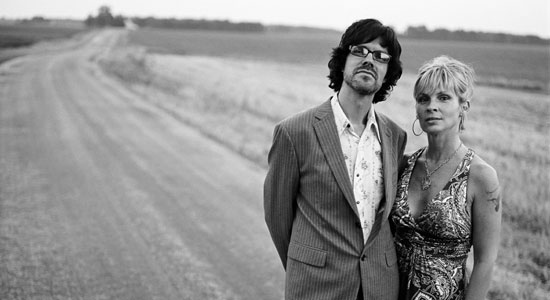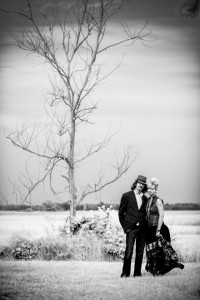As the tuning chords strummed by Karin Berquist and Linford Detweiler reverberated in the intimate space of Eddie’s Attic a couple of weeks ago, on the warm evening of August 23, I noticed the rapt attention of the audience. We were all fully present, even before their first song began, having already abandoned worries and distractions as we enjoyed Kim Taylor’s opening set. I mused about the way this collective attentiveness aligned with the quality of mindfulness in Over the Rhine’s music. Karin and Linford chatted with the audience as they adjusted their instruments, and I experienced a moment of synchronicity when Linford pointed out the double entendre of the name they have given their home in Ohio: Nowhere Farm. The same letters in the same order yield “Now Here Farm” – now here, as in completely paying attention to the present, as in being in the state of mindfulness that Over the Rhine consistently inspires its listeners to occupy.
It was autumn in 1996 when I first heard the arresting sounds of Over the Rhine –a group then local to me in Ohio. This indie rock duo’s musical partnership has spanned two decades and deservedly had my attention for much of that time. It is not often that music moves with you for that long…intertwining its growth with various periods of your personal development. Over the Rhine is one of those rare bands. In the parallel space that we’ve shared, I have gleaned elements related to mindfulness that I believe take their music and connection with others to a higher level.
Mindfulness-based meditation, with its roots in eastern Vipassana meditation, has been defined by Jon Kabat-Zinn as “Paying attention, on purpose, to the present moment, without judgment.” These are ingredients I see infused in Karin and Linford’s songwriting and performing.
Paying attention, acceptance, and its gifts:
It still amazes me that one of Over the Rhine’s most popular songs and a personal favorite, “Latter Days,” was written in under 10 minutes! In our interview, which took place before their August 24th performance in the Red Clay Theatre in Duluth, just outside of Atlanta, Linford refers to these ready-made songs as “gifts,” which he speaks about in terms of the importance of being open to receiving. The concept of being ready to receive certainly highlights how crucial it is to stay present, in the moment, without judgment. It is a useful reminder that we will miss out on such gifts when we are busy chasing after ideas of what we think we need or trying to force something to happen the way we believe it must.
Nonstriving:
So, “slow down, hold still. It’s not as if it’s a matter of will,” Karin cautions in the song “All I Need Is Everything.” She goes on to share the challenge of acceptance and nonstriving; “if I look for it, it won’t come. I tense up. My mind goes numb. There’s nothing harder than learning how to receive.” The song contrasts our longing for “everything,” the desire that pulls us out of the moment, with the worth of remaining grounded in the present just as it is without seeking something else or something more. This embodiment of the now is what allows us to be open and receive. The paradoxical wisdom the song imparts is the need to let go of searching, in order to find.
Present Moment:
Linford discusses the layers of a song as growing over time. These layers evolve as they are written and as others listen to them, placing their own transparencies over them to form new meanings. He has mentioned before that he may write a song and not know what he is writing until it’s fully formed. For many of us, this is a needed reminder of the value of being in the moment, even if some aspect of our present experience is unclear to us, rather than grasping for an outcome that is not yet possible. A quote from Rainer Marie Rilke’s Letters to a Young Poet comes to mind:
…try to love the questions themselves as if they were locked rooms or books written in a very foreign language. Don’t search for the answers, which could not be given to you now, because you would not be able to live them. And the point is to live everything.
Nonjudgment:
Our connections to our present experiences and to one another are richest when they are not strained by judgment. As we pointed out in From Irritation to Appreciation…, part of the Eastern philosophy underpinning meditation is the belief that all beings suffer, and this shared human truth opens our hearts to compassion. When Karin sings the haunting “All My Favorite People Are Broken,” there is a sense of remaining in the present, right there with the suffering and those who suffer, without judgment. We are all “part saint and part sinner,” and we are all broken in some way, but there is no need to run from our experiences, to try to somehow escape the present moment, whatever it may hold. Instead, we can even “praise the mutilated world,” as the poet Adam Zagajewski, to whom this line in the song alludes, encourages us to do. References to poetry aren’t surprising to find among Over the Rhine’s lyrics, as their attentiveness to language borders on poetry, which is itself a vehicle for mindfulness. As we stay mindfully present, even in difficult circumstances, it helps to remember (and to have Karin sing for us) “you’re safe right here. You don’t have to go.”
Safe containers for whatever arises in the present moment:
As songwriters, Karin and Linford have used their words to convey certain emotions but, beyond this, they view their music as a tool for working with those emotions. As a practitioner and teacher of meditation, I truly relate to Linford’s description of music as a container for emotions. He has spoken about sad songs being a container in which we can place our sorrow, in order to release it and make a fresh start. He reveals how special it is that people bring Over the Rhine’s songs to momentous personal occasions such as weddings, births, and even funerals.
In therapy as a whole, and in meditation specifically, it is crucial to create a safe container for the healing journey to begin and unfold. In fact, the My Mindful Way of Life Visualization CD includes a track on “Creating a Safe Container,” which guides one to work with and manage difficult emotions.
Enjoy the interview and Linford’s take on music as a container– click below!
Over the Rhine is releasing Meet Me at the Edge of the World, their 21st album, which can be purchased on their website or itunes, on September 3rd. My Mindful Way of Life readers who reside in the Atlanta area will be excited to learn that Over the Rhine will return to Atlanta for “An Electric Christmas” at the Variety Playhouse on December 15. Readers across the country and even across the globe will definitely want to keep up with their list of upcoming shows and locations on their website.
I look forward to hearing your stories about how Over the Rhine’s music has impacted you. I encourage you to share your favorite moments in the comment space below. Your perspective may inspire someone else!
To get updates on our forthcoming Mindful Music series or to learn more about the science behind applying mindfulness and self-awareness for habit change, you are invited to check out Dr. Klich’s website and sign up for the monthly newsletter at MyMindfulwayoflife.com
To receive additional helpful health hints, “like” MyMindfulWayofLife on Facebook and follow Dr. Klich on Twitter.
Here’s a personal favorite tune of theirs:
Dr. Klich and Linford Detweiler exchange views on mindfulness and music in the green room at Red Clay Theater. Be sure to sign up for OTR’s newsletter for an insider’s view of their music making world.




Nice interview. I’ve got several bands that have been a constant in my life, through different cities, different jobs, different health issues, but the same music. Very grounding.